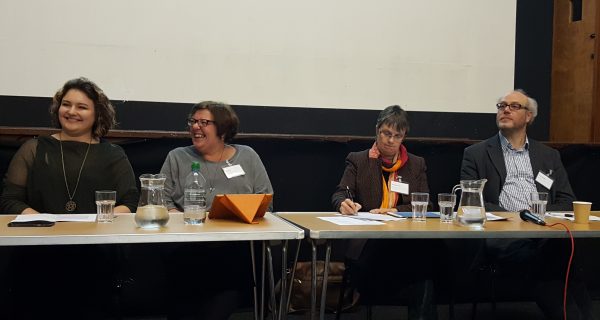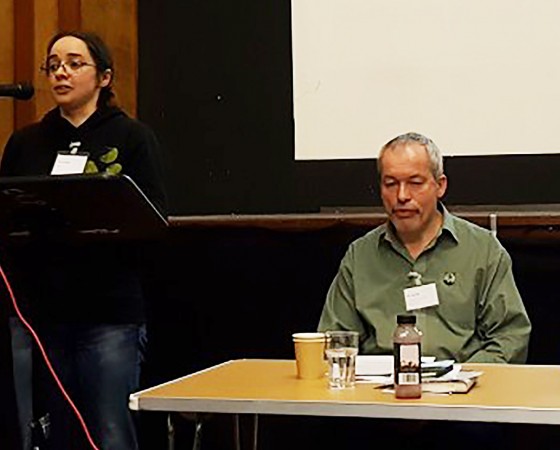With unethical employment practices on the rise, jobs becoming insecure and wages declining, it is crucial for co-ops to take control of the future of work, a conference heard.
The future of work was a key topic at the Co-operative Ways Forward Conference in Manchester, an event organised by Co-operative Business Consultants.
And Ieva Padagaite, member of the Blake House Filmmakers Cooperative, said this was was a pressing issue in the creative industries.
Ms Padagaite said she learned about the co-op movement through Strike, a co-operative magazine.
“I’m not a natural co-operator myself,” she said. Growing up in Lithuania after its independence from the Soviet Union, she was taught that hard work and a degree would make her happy in a world of freedom and open borders.
“People suffer in silence,” she said, “because in society where everything is allowed and everything is possible, it can only be your fault if you are not clever enough to meet your needs and aspirations.”
Through Strike, Ms Padagaite got in contact with young co-operators from Cultural Coops and Altgen, who introduced her to the co-op model.
With her colleague Simon Ball, she started Blake House as an alternative to “precarious, exploitative and unethical practices” in the creative industries.
“We need to reclaim the future of work,” she said, “so that people in the growing creative, tech, freelance and other service industries can identify as workers, without cringing.
“Yes, we are entrepreneurs, creatives, freelancers, technologists, developers – and we are workers. It’s a political and technical term, and takes time to grasp.”
Cila Ross, vice principal for Co-operative Education & Research at the Co-operative College, agreed that the notion of work was changing.
“Co-ops to me should be beacons of decent work,” she said. She thinks that there is some unease about using the word worker, but it’s something co-ops are very proud about. “Semantically, there are issues in the modern economy using words that sound like 19th century,” she added.
Another panelist, MEP Molly Scott Cato, said: “Co-ops are about ensuring that those who create the value benefit from the goods created,” adding that co-operation was a form of economic democracy.
“It’s important that we recognise how crucial our movement is to defending the future of democratic life, with the rise of the far right.”
She talked about the danger of the UK becoming a “no wage, no tax” economy, in the aftermath of Brexit. The MEP highlighted the “important role” played by co-ops in the renewable energy sector, making sure green energy was not “enclosed and privatised”.
“Nothing is written, what happens next is up to us,” she told delegates.

Another example came from Vivian Woodell, chief executive of the Phone Co-op and board member of the Midcounties Co-operative. He said the trend in the online economy was towards unnatural monopolies, with businesses like eBay, Google, Amazon, AirBnB or Uber “displaying monopolistic behaviour”.
He called on the co-operative movement to carve out a role in some of these sectors. “Midcounties has showed that a co-op approach can work in energy supply,” he said, adding that Co-op Energy had grown to include 250,000 customers.
Mr Woodell argued that these monopolies came into being by taking “huge risks”, which co-ops often refuse to take for fear of not meeting their members’ needs. Around 95% money could be lost when investing in risky businesses, stressed the chief executive.
He explained how Fairmondo, a co-operatively owned online marketplace had started with limited resources. “Co-ops can help taking greed out of the situation, by having platform co-ops taking their share in the economy,” he added.
In a separate session, Bob Cannell and Jenny Carlyle looked at how hierarchy can impact on co-operation. The two are members of Suma Wholefoods, an equal-pay worker co-operative based in Leeds and the UK’s largest independent wholefood wholesaler/distributor, specialising in vegetarian, fairly traded, organic, ethical and natural products.
“Once you’ve worked in a flat structure, you realise how ridiculous that hierarchic structure is,” said Ms Carlyle, who has been with Suma for 10 years.

She said Suma was making a difference in a sector characterised by low paid jobs – even temporary students employed in the warehouse are paid the same amount. Workers also get to perform different tasks.
“There is no ladder to climb, Suma is a world of opportunity,” she said, adding that while working for the co-op she was able to gain experience in different areas, including management, business analysis, marketing and sales.
Asked why the co-op was not moving into other employment areas, Mr Cannell said: “We are very cautious when we expand, we don’t take risks lightly.
“One of my big challenges as co-op development worker is having people first. You don’t start co-op with rules and a business plan, you start with people – how are they going to get along together?”
Siôn Whellens from Calverts, a communications design, print and production house, argued there were philosophical and political reasons why it could be difficult to replicate successful worker co-ops.
“Worker co-ops were started by anarchists and communists would wouldn’t want a hierarchy,” he said. “People of different generations are given time to understand how it works.
“The co-op movement is not a movement of businesses, but a movement of people – businesses were created as a compromise.”
Mr Cannell said: “In a co-op like Suma you need a financial director function. But it can be a team of people doing that function. It costs less, it is less dangerous, people coming in are learning and we are getting decent succession.”
Ms Carlyle added: “We can teach people values, tell them there is an alternative there. We see the future as having multiple Sumas across the country. Once we break ground, hopefully, it will be easier for the other co-ops to do that, too. We are a growing organisation.”

